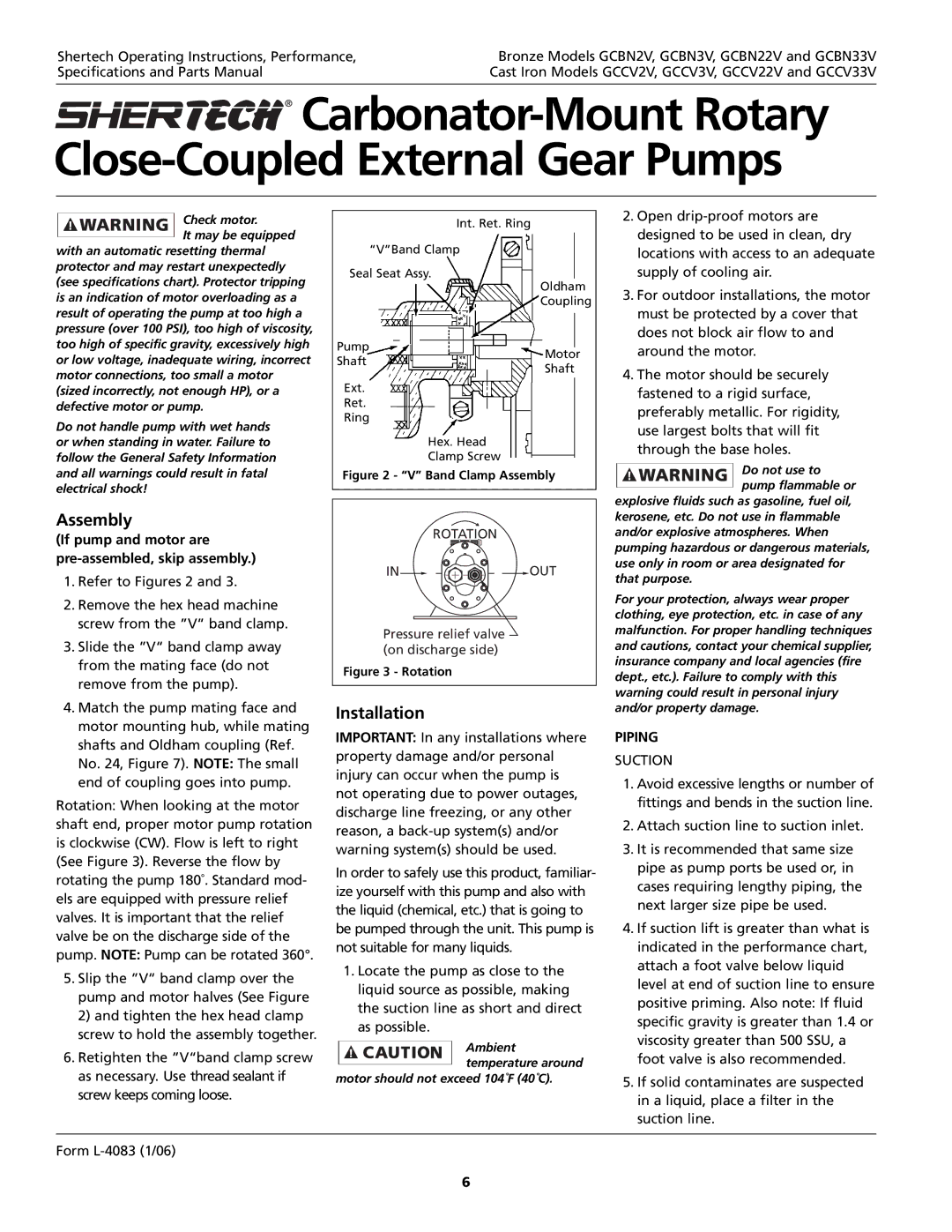
Shertech Operating Instructions, Performance, | Bronze Models GCBN2V, GCBN3V, GCBN22V and GCBN33V |
Specifications and Parts Manual | Cast Iron Models GCCV2V, GCCV3V, GCCV22V and GCCV33V |
|
|










Carbonator-Mount Rotary Close-Coupled External Gear Pumps
Check motor.
It may be equipped
with an automatic resetting thermal protector and may restart unexpectedly (see specifications chart). Protector tripping is an indication of motor overloading as a result of operating the pump at too high a pressure (over 100 PSI), too high of viscosity, too high of specific gravity, excessively high
Int. Ret. Ring
“V”Band Clamp
Seal Seat Assy.
Oldham
Coupling
Pump
2. Open |
designed to be used in clean, dry |
locations with access to an adequate |
supply of cooling air. |
3. For outdoor installations, the motor |
must be protected by a cover that |
does not block air flow to and |
or low voltage, inadequate wiring, incorrect motor connections, too small a motor (sized incorrectly, not enough HP), or a
Shaft
Ext.
Motor Shaft
around the motor. |
4. The motor should be securely |
fastened to a rigid surface, |
defective motor or pump.
Do not handle pump with wet hands or when standing in water. Failure to follow the General Safety Information and all warnings could result in fatal electrical shock!
Ret.
Ring
Hex. Head
Clamp Screw
Figure 2 - “V” Band Clamp Assembly
preferably metallic. For rigidity, |
use largest bolts that will fit |
through the base holes. |
Do not use to pump flammable or
Assembly
(If pump and motor are
1.Refer to Figures 2 and 3.
2.Remove the hex head machine screw from the ”V“ band clamp.
3.Slide the ”V“ band clamp away from the mating face (do not remove from the pump).
4.Match the pump mating face and motor mounting hub, while mating shafts and Oldham coupling (Ref. No. 24, Figure 7). NOTE: The small end of coupling goes into pump.
Rotation: When looking at the motor shaft end, proper motor pump rotation is clockwise (CW). Flow is left to right (See Figure 3). Reverse the flow by rotating the pump 180˚. Standard mod- els are equipped with pressure relief valves. It is important that the relief valve be on the discharge side of the pump. NOTE: Pump can be rotated 360°.
5.Slip the ”V“ band clamp over the pump and motor halves (See Figure 2) and tighten the hex head clamp screw to hold the assembly together.
6.Retighten the ”V“band clamp screw as necessary. Use thread sealant if screw keeps coming loose.
ROTATION
IN![]()
![]()
![]()
![]()
![]() OUT
OUT
Pressure relief valve (on discharge side)
Figure 3 - Rotation
Installation
IMPORTANT: In any installations where property damage and/or personal injury can occur when the pump is not operating due to power outages, discharge line freezing, or any other reason, a
In order to safely use this product, familiar- ize yourself with this pump and also with the liquid (chemical, etc.) that is going to be pumped through the unit. This pump is not suitable for many liquids.
1.Locate the pump as close to the liquid source as possible, making the suction line as short and direct as possible.
Ambient temperature around
motor should not exceed 104˚F (40˚C).
explosive fluids such as gasoline, fuel oil, kerosene, etc. Do not use in flammable and/or explosive atmospheres. When pumping hazardous or dangerous materials, use only in room or area designated for that purpose.
For your protection, always wear proper clothing, eye protection, etc. in case of any malfunction. For proper handling techniques and cautions, contact your chemical supplier, insurance company and local agencies (fire dept., etc.). Failure to comply with this warning could result in personal injury and/or property damage.
PIPING
SUCTION
1.Avoid excessive lengths or number of fittings and bends in the suction line.
2.Attach suction line to suction inlet.
3.It is recommended that same size pipe as pump ports be used or, in cases requiring lengthy piping, the next larger size pipe be used.
4.If suction lift is greater than what is indicated in the performance chart, attach a foot valve below liquid level at end of suction line to ensure positive priming. Also note: If fluid specific gravity is greater than 1.4 or viscosity greater than 500 SSU, a foot valve is also recommended.
5.If solid contaminates are suspected in a liquid, place a filter in the suction line.
Form L-4083 (1/06)
6
